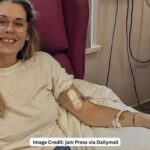Woman Diagnosed With Stage 3 Cancer After Ignoring One ‘Embarrassing Symptom’
The post Woman Diagnosed With Stage 3 Cancer After Ignoring One ‘Embarrassing Symptom’ appeared first on Healthy Holistic Living.
Sometimes, the subtlest changes in our bodies speak volumes, yet we shrug them off, attributing them to benign causes like diet or stress. Jelena Tompkins, a Colorado native and fitness enthusiast, learned the hard way that ignoring what seemed like a minor, albeit embarrassing, symptom could lead to life-altering consequences. At just 34, her health journey took an unexpected turn, pushing her into a battle she never anticipated. This is not just a story about facing cancer; it’s a wake-up call to all of us about the importance of listening to our bodies. Join us as we delve into Jelena’s story, exploring the crucial moments from symptom to diagnosis and beyond, shedding light on why every sign our body gives us deserves our attention—no matter how small it may seem.
Recognizing the Signs
When Jelena Tompkins first noticed an unusual change—her gas smelled worse than usual—she chalked it up to her healthy, vegetable-rich diet. It was an easy explanation that fit comfortably within her understanding of health and nutrition. Jelena, an avid runner, maintained a vigorous fitness regime and had always considered herself the epitome of health. But as the weeks turned into months, this minor symptom persisted, evolving subtly yet significantly.
Ignoring initial bodily changes is common; many of us do it, especially when symptoms seem harmless or embarrassing to discuss. However, Jelena’s experience underlines a critical message: not all symptoms are as innocuous as they appear. When she eventually noticed blood in her stool, a more alarming signal, the gravity of her situation began to take shape. Despite this, even her doctor initially guessed that the change was diet-related.
Rectal cancer, like many other cancers, can manifest through signs often dismissed as dietary effects or minor health issues. Symptoms such as changes in bowel habits, unexplained weight loss, fatigue, or, as in Jelena’s case, changes in the appearance or smell of stool, should prompt further investigation. While it’s easy to overlook such symptoms, especially for those who are young and feel healthy, Jelena’s story teaches us the importance of taking every change seriously and advocating for our health even when the symptoms seem trivial or embarrassing.
Here are some of the common but often overlooked signs of potential health issues:
Persistent Changes in Digestive Patterns: Any long-term change in bowel habits or digestive function warrants attention. This could include persistent diarrhea, constipation, a change in the color or consistency of stool, or an unusual smell. Such symptoms could indicate a variety of health issues, from benign conditions like irritable bowel syndrome to more serious diseases like cancer.
Unexplained Weight Loss: Losing weight without trying can be a sign of several disorders, including diabetes, thyroid problems, and cancer. It’s especially significant if the weight loss is rapid and unexplained by changes in diet or exercise habits.
Chronic Fatigue: Feeling tired all the time can be easy to dismiss as a result of a busy lifestyle. However, chronic fatigue that does not improve with rest should be evaluated as it can be a symptom of underlying conditions such as cancer, heart disease, or sleep disorders.
Visible Changes in Physical Appearance: This can include new moles or changes in existing ones, which could be a sign of skin cancer. Similarly, persistent skin changes, unusual bleeding, or swelling can also be warning signs that require professional evaluation.
Discomfort or Pain: Persistent or severe pain that does not resolve with standard care should not be ignored. Pain is the body’s way of signaling that something is wrong, and it can be associated with a variety of health conditions, from infections to cancers.
By being vigilant and responsive to these signs, individuals can catch potentially serious health issues early, significantly boosting the chances for successful treatment. Maintaining regular communication with healthcare providers and seeking medical advice when unusual symptoms persist is crucial.
The Journey to Diagnosis
Jelena’s path to diagnosis began with a simple annual check-up—a routine appointment that most of us might not think twice about. During this visit, she brought up the blood she had noticed in her stool, a symptom that finally pushed her concerns beyond the threshold of dietary excuses. Initially, her doctor suggested that her diet might still be the culprit, reflecting a common assumption that minor digestive issues are often food-related. However, as the symptom persisted, the need for deeper investigation became apparent.
Three months later, her doctor recommended further tests to narrow down any specific dietary causes, but these tests turned up nothing conclusive. This led to the decision to perform a more invasive, yet definitive, examination: a colonoscopy. The procedure, typically recommended for those over 50 or those with risk factors, was not something Jelena had anticipated at her age. The results, however, were a stark deviation from her expectations: stage 3 rectal cancer.
This sequence of events underscores the indispensable role of regular medical check-ups. They are often the first line of defense in detecting changes that might be symptoms of something more serious. For Jelena, speaking up during her routine check-up was crucial—even though the initial response was not alarm.
Her story highlights the importance of being proactive about health concerns, especially when symptoms persist or worsen. It reminds us that health advocacy is crucial; we must persistently seek answers, even when first explanations don’t align with ongoing symptoms. Regular screenings and timely doctor visits can significantly alter outcomes, offering opportunities for early intervention that might otherwise be missed.
Treatment and Challenges
Once diagnosed, Jelena faced an immediate and daunting path forward. Her treatment regimen began with an intensive 28-day course of radiation and oral chemotherapy. This aggressive approach aimed to shrink the tumor before any surgical intervention. Following the radiation, Jelena underwent a significant surgical procedure where surgeons removed 12 inches of her colon along with 17 lymph nodes, of which five were found to be cancerous.
The challenges of such treatment are multifaceted—physical, emotional, and psychological. Physically, the effects of radiation and chemotherapy are often severe, including fatigue, nausea, and a significant impact on the immune system. Emotionally, the stress of dealing with a cancer diagnosis and the uncertainties of treatment outcomes can be overwhelming. Psychologically, the adjustment to a new, unexpected life trajectory can strain even the most resilient individuals.
Jelena’s determination was evident as she navigated these challenges. Post-surgery, her recovery involved adapting to life with an ileostomy—a procedure where the end of the small intestine is diverted to an opening in the abdomen, creating a stoma. This was a temporary but significant change, requiring her to learn a whole new approach to managing daily physical functions.
Two months after completing her final round of chemotherapy, Jelena had her ileostomy reversed, marking another phase of adjustment as she reacquainted her body with its old functions, now altered by surgery and treatment. Each step brought its own set of challenges, pushing Jelena to adapt continually.
Jelena’s experience exemplifies the resilience required in cancer treatment and recovery. It highlights not just the physical battles but also the mental and emotional resilience needed to face each day. Her journey provides a profound insight into the complexities of cancer treatment, reminding us of the critical support systems needed for anyone walking this path.
Life After Cancer
After her rigorous treatment and surgery, Jelena Tompkins entered a new phase in her life—post-cancer recovery and remission. This period, often as challenging as the treatment itself, required close medical surveillance and a deep psychological adjustment to the new norms of her physical health.
Jelena’s journey didn’t end with remission. She continued to undergo maintenance chemotherapy to manage any potential recurrence of cancer. Her follow-up care was intensive at first, including regular CT scans and blood work to monitor her cancer markers and overall health, gradually decreasing in frequency as her condition stabilized. The psychological adjustment was equally significant, involving coping with the fear of recurrence and adapting to a changed body image and function post-surgery. Managing this mental and emotional transition is crucial as it directly influences one’s overall well-being and quality of life.
Rebuilding physical health was another vital aspect of Jelena’s recovery. As an avid runner, slowly resuming her activities, albeit at a more measured pace, not only helped her rebuild her physical health but also regain a sense of normalcy and control over her life. Additionally, throughout her recovery, Jelena found immense support from online communities and social media groups comprising individuals who had faced similar health battles. This network provided not just emotional solace but also practical advice on navigating the complexities of life post-cancer.
Jelena’s story highlights that life after cancer involves a series of adjustments, challenges, but also opportunities for growth and a renewed appreciation for health. It underscores the importance of a comprehensive care approach that includes medical, psychological, and social support to help survivors thrive beyond cancer.
The Role of Community and Support
Throughout her battle with cancer and into her recovery, Jelena discovered the invaluable role that community and support play in navigating such profound life challenges. Social media became an unexpected yet crucial ally. By connecting with others who were undergoing or had completed similar treatments, Jelena found not only solace but also practical advice and emotional support.
These connections provided a sense of belonging and understanding that is often missing in the everyday interactions with those who haven’t faced similar trials. The shared experiences within these communities help to demystify the treatment process, provide insights on managing side effects, and offer encouragement during moments of despair.
Moreover, the support from these networks goes beyond just emotional backing; it extends into sharing personal stories that inspire and educate others about the importance of early detection, the realities of treatment, and the journey of recovery. For Jelena, and many like her, these communities are not just support groups; they are lifelines that reaffirm life’s potential even in the face of cancer.
Jelena’s experience underscores how crucial it is to cultivate and maintain these support networks. They play a significant role in the healing process, providing both psychological comfort and practical assistance. In highlighting the importance of community, Jelena’s story invites others to seek out and contribute to such networks, enhancing the collective resilience against the challenges posed by cancer.
Practical Tips for Recognizing and Reacting to Health Changes
Detecting cancer early can significantly increase the chances of successful treatment and recovery. Based on Jelena’s experience and broader medical advice, here are some essential tips to help in the early detection and prevention of cancer:
Stay Informed About Common Symptoms: Knowing the common symptoms of serious health issues like cancer can be your first line of defense. Simple awareness of changes such as persistent coughs, changes in moles, unusual lumps, or unexpected bleeding can make a big difference.
Listen to Your Body: Pay close attention to what your body is telling you. If you notice anything unusual, such as persistent discomfort or changes in bodily functions, don’t brush it aside. Your body’s signals are worth listening to, even if they seem minor.
Keep Regular Doctor Appointments: Make it a priority to visit your doctor regularly, even if you feel healthy. Use these visits as a chance to discuss any small changes you’ve noticed. Early conversations can lead to early action.
Document Your Symptoms: Keep a simple health diary where you jot down any symptoms or changes you observe. This record can be incredibly helpful for healthcare providers in diagnosing and understanding potential issues.
Educate Yourself on Family History: Spend some time learning about your family’s medical history. Some conditions are hereditary, and knowing your risk can guide more personalized and proactive health screenings.
Leverage Free Screenings: Take advantage of free screening opportunities often provided by health departments, hospitals, or community centers. These can be a no-cost way to get checked for various health conditions.
Talk Openly About Health Concerns: Encourage open discussions about health within your family and community. Sharing experiences can demystify symptoms and encourage others to seek help without hesitation.
Lead a Balanced Lifestyle: While it’s not a foolproof method against diseases, maintaining a balanced diet, regular exercise, and adequate sleep can bolster your body’s defenses and overall well-being.
These tips aim to empower your readers by equipping them with practical, actionable steps they can take to enhance their health awareness and proactive care practices. This approach not only makes the information more accessible but also emphasizes the importance of everyday health vigilance.
Embracing Resilience and Awareness
Jelena Tompkins’ journey from ignoring an ’embarrassing’ symptom to confronting and overcoming stage 3 cancer is a powerful testament to the resilience of the human spirit and the critical importance of health awareness. Her story illuminates the dangers of dismissing seemingly minor health issues and the transformative impact of medical intervention, community support, and personal advocacy.
Through her experience, we learn that health is not just the absence of illness but the proactive management of our well-being. It’s a reminder that being attuned to our bodies, engaging in regular health check-ups, and seeking timely medical advice are fundamental to maintaining our health. Moreover, Jelena’s story highlights the profound role of support networks—both online and in-person—that help individuals navigate the complexities of illness and recovery.
As we share in the narrative of Jelena’s courage and recovery, let it inspire us to take action towards our health concerns, support others in their health journeys, and build communities that foster healing and resilience. By embracing these principles, we not only enhance our capacity to confront personal health challenges but also contribute to a healthier, more supportive society.
The post Woman Diagnosed With Stage 3 Cancer After Ignoring One ‘Embarrassing Symptom’ appeared first on Healthy Holistic Living.












